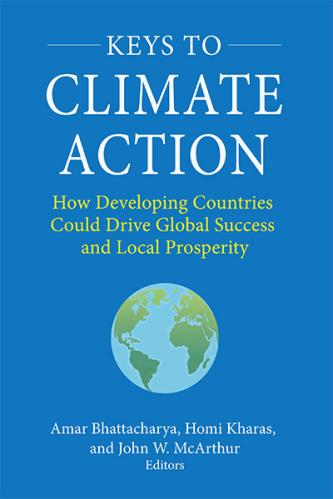There is an emerging consensus among governments that aggressive climate change mitigation would be desirable, though they remain bitterly divided about how the associated burden should be shared. The Government of India has made a commitment not to allow the country’s per capita emissions to rise above per capita emissions in the advanced countries (ACs). Developing Countries (DCs), more generally, have concomitantly demanded that every person on earth should have the same emissions rights over the atmospheric global commons.
In a paper recently published by the University of Oxford’s Smith School of Enterprise and the Environment, Vijay Joshi and I argue that an attractive criterion for burden sharing could involve emissions permit allocation to each developing country to prevent the estimated welfare loss it would suffer from undertaking (costly) climate mitigation (in other words, a “no harm” principle for DCs). We are strongly attracted to this norm as a reasonable compromise between fairness to DCs and acceptability to ACs. We argue that India should reconsider its stance and negotiate to join a mitigation treaty, say in 2020, if it can negotiate a fair deal on the above basis.
The paper brings to notice that over 40 percent of Indians do not have access to electricity, and coal will continue to be the dominant fuel for power generation in India (and, indeed, elsewhere). However, carbon capture and sequestration (CCS), is expensive and will almost double the cost of electricity from coal-fired stations, which consumers in poor countries will simply not be able to pay. In this regard, sale of permits by India would help to fund the installation of clean coal technology to existing and new coal-fired power plants, and India would be compensated for the cost of cutting future emissions for several decades.
We observe that any questioning of India’s effort toward curtailing emissions would need to recognise, inter alia, the contribution to “net carbon taxes” of present (and past), often heavy, taxation of energy. A very rough and ready proxy calculation indicates that the net taxation (after deducting subsidies) on petroleum entails an “emissions tax” of about $49/tonne of carbon dioxide emitted from this source in 2007. On the other hand, emissions from coal are (implicitly) “taxed” at around one dollar per tonne, and for the energy sector as whole, emissions (on average) are “taxed” at about $6/tonne.
We conclude that it is in India’s interest to help reach a new settlement if it is fair and rich countries agree to significant emissions cuts of their own. India’s co-operation could prompt China and the U.S. to follow suit and win “first-mover advantage” in carbon permit allocations. An additional benefit could include a seat on the U.N. Security Council.



Commentary
India and a Carbon Deal
November 2, 2009